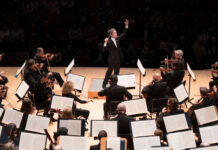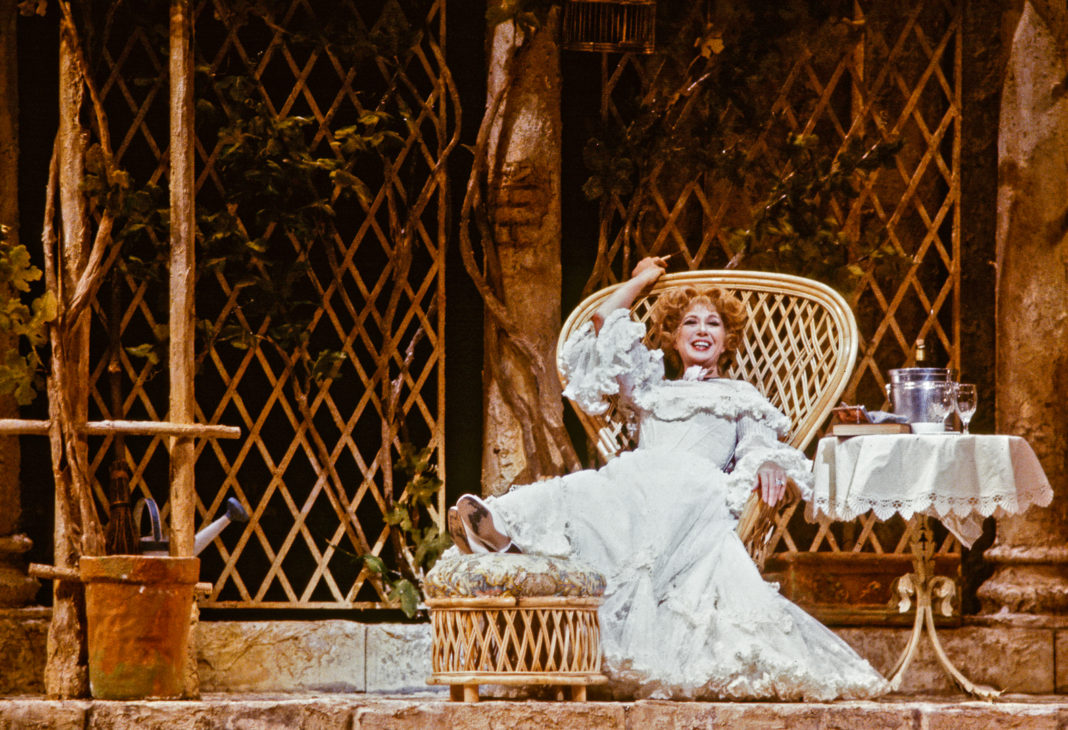The US government decreed that March would be Women’s History Month starting in 1987. But anyone who knows the world of opera knows that women have long played a strong role on opera stages around the world. Week 51 at the Met celebrates women on and off-stage.
Amongst the great performers are Hildegard Behrens, Renée Fleming, Mirella Freni, Susan Graham, Marilyn Horne, Jessye Norman, Leontyne Price, Patricia Racette, Golda Schultz and Beverly Sills. One of this week’s productions was directed by two-time Tony Award winner Julie Taymor.
All productions become available at 7:30 PM EST/4:30 PM PST and remain available for 23 hours. Schedules and timings may be subject to change.
The Met is heavily promoting their Met Stars Live in Concert series and the planned resumption of performances in the 2021-2022 season, so you’ll have to go past those announcements and promos to find the streaming productions on the Metropolitan Opera website.
If you read this column early enough on March 1st, you might still have time to catch the 2014-2015 production of Il Trovatore by Giuseppe Verdi that concludes Dmitri Hvorostovsky Week at the Met.
Here is the full line-up of Week 51 at the Met:
Monday, March 1 – Donizetti’s Don Pasquale
Conducted by Nicola Rescigno; starring Beverly Sills, Alfredo Kraus, Håkan Hagegård and Gabriel Bacquier. This John Dexter production is from the 1978-1979 season. This is an encore presentation of the production that was made available on July 4th.
Gaetano Donizetti’s opera had its world premiere in Paris in 1843. The composer collaborated with Giovanni Ruffini on the libretto. It was inspired by the libretto Angelo Anelli had written for Ser Mercantonio, an opera by Stefano Pavesi from 1810.
Ernesto is Don Pasquale’s nephew. He wants to marry Norina, but Don Pasquale wants to choose his nephew’s bride. Others conspire against Pasquale and trick him so that ultimately Ernesto and Norina can marry.
With her role as Norina in this production of Don Pasquale, Beverly Sills gave her final performance at the Metropolitan Opera. This was a new production of the opera and was apparently created with Sills in mind.
Harold C. Schonberg, writing for the New York Times said of Sills’ performance, “The role of Norina did not tax Miss Sills’ vocal resources as much as some recent ones she has attempted. It would be idle to claim that she could handle everything in the part, but she paced herself well, avoided elaborate cadenzas or interpolations, and tried to project a clear line. Her work Thursday night was a triumph of experience and professionalism.”
Tuesday, March 2 – Verdi’s Falstaff
Conducted by James Levine; starring Mirella Freni, Barbara Bonney, Marilyn Horne, Susan Graham, Paul Plishka, Frank Lopardo and Bruno Pola. This revival of Franco Zeffirelli’s 1964 production is from the 1992-1993 season. This is an encore presentation of the production that was made available on July 24th, October 23rd and February 16th.
Two of Shakespeare’s play served as the inspiration for Verdi’s Falstaff: The Merry Wives of Windsor and sections from Henry IV Parts 1 and 2. Arrigo Boito adapted the plays to create the libretto. Falstaff had its world premiere in 1893 at La Scala in Milan. This was Verdi’s final opera and only his second comedic opera.
Simply put, Sir John Falstaff tries everything he can to woo two married woman so he can assume their husband’s vast fortunes. He’s rather bumbling in his efforts and the machinations in place to thwart his endeavors leave him with nothing short of a major comeuppance.
Edward Rothstein, writing for the New York Times, seemed to thoroughly enjoy the production. And he was very pleased with Plishka’s performance as the title character:
“Mr. Plishka gave the role an almost touchingly human quality. In the astonishing first scene aria, in which Falstaff declares his ambitions, mocks the idea of honor and praises his belly, there were few mannerisms or exaggerations. Mr. Plishka played it straight; he was a Falstaff almost enticingly full of himself. His voice was not often handsome (why should it have been?) but it was large, weighty and in character.”
Wednesday, March 3 – Wagner’s Die Walküre
Conducted by James Levine; starring Hildegard Behrens, Jessye Norman, Christa Ludwig, Gary Lakes, James Morris and Kurt Moll. This revival of the 1986 Otto Schenk production is from the 1988-1989 season. This is an encore presentation of the production that was made available June 30th, October 8th and February 14th.
This is the second opera in Richard Wagner’s Der Ring des Nibelungen (also known as The Ring Cycle.) It had its premiere as a stand-alone opera in 1870 in Munich. The first performance of the entire cycle was at Bayreuth six years later. Wagner wrote the libretto as well as the music.
The son of the god Wotan is a fugitive named Siegmund. When he finds himself taking refuge at Sieglinde’s house, the two fall passionately in love. But Sieglinde is married and in order for her and Siegmund to be together Siegmund must defeat her husband in a battle to the death.
This production marked the first time Norman sang the role of Sieglinde at the Metropolitan Opera. She earned rave reviews. What disappointed Donal Henahan is his New York Times review were the very things that make this film possible.
“The most objectionable feature of the evening, however, was also a technological one. Television cameras worked away throughout the performance from positions at either side of the stage and at the foot of both aisles, distracting what surely must have been hundreds of people seated in line with brightly lighted monitor screens. The machines, one learned, were rehearsing for a later Walkure telecast and making ‘scratch’ tapes that might be needed as backups. This, mind you, from a company that will not employ supertitles because they detract the audience’s attention from the stage.”
With this production you’ll get to see the end result of that distraction.
Thursday, March 4 – Mozart’s Die Zauberflöte
Conducted by James Levine; starring Golda Schultz, Kathryn Lewek, Charles Castronovo, Markus Werba, Christian Van Horn and René Pape. This revival of the 2004 Julie Taymor production is from the 2017-2018 season. This is an encore presentation of the production that was made available on June 28th and October 1st.
Mozart’s opera premiered in September 1791 in Vienna a mere two months before the composer died. It features a libretto by Emanuel Schikaneder.
Prince Tamino is asked by the Queen of the Night to free her daughter Pamina from Sarastro. Tamino, however, is impressed with Sarastro and the way his community lives in the world and wants to be a part of it. Both alone and together Tamino and Pamina endure multiple tests. If they succeed, what will happen to them? To the Queen of the Night?
Anyone who has seen Taymor’s work for such shows as Juan Darién and The Lion King knows that she regularly employs puppets and wildly inventive staging.
Alex Ross, writing for The New Yorker about the original 2004 production said, “The Met stage has never been so alive with movement, so charged with color, so brilliant to the eye. The outward effect is of a shimmering cultural kaleidoscope, with all manner of mystical and folk traditions blending together. Behind the surface lies a melancholy sense that history has never permitted such a synthesis—that Mozart’s theme of love and power united is nothing more than a fever dream. But Taymor allows the Enlightenment fantasy to play out to the end.”
Friday, March 5 – Britten’s Peter Grimes
Conducted by Sir Donald Runnicles; starring Patricia Racette, Anthony Dean Griffey and Anthony Michaels-Moore. This John Doyle production is from the 2007-2008 season. This is an encore presentation of the production that was made available on May 14th, September 1st, November 13th and December 9th.
Benjamin Britten’s Peter Grimes had its world premiere in London in 1945. The libretto was written by Montagu Slater who based it on a poem in The Borough by George Crabbe.
In Peter Grimes, the title character is facing intense questioning after his apprentice has died. The townsfolk believe him to be responsible, the coroner rules he was not. Shortly afterward, Grimes recruits another apprentice, John. Ellen, the only person in town who believes Grimes, later finds herself questioning Grimes when she finds that John has intense bruising on his neck. Word spreads quickly about the boy’s injuries and the people in town want an investigation. What follows is tragic on multiple levels.
The title role was written by Benjamin Britten for his partner, Peter Pears. In the mid 60s, Jon Vickers’s performance has been considered definitive for quite some time.
John Doyle, best known for his minimalist productions of Stephen Sondheim musicals, made his Met Opera debut with this production of Peter Grimes. Griffey, having sung this opera a few times before this production, finally found his way into a lead role at the Met.
Anthony Tommasini, writing in the New York Times, found some unique qualities in how Griffey tackled the part: “Mr. Griffey, even though his voice has heft and carrying power, is essentially a lyric tenor. And it is disarming to hear the role sung with such vocal grace, even sweetness in places. Every word of his diction is clear. You sense Grimes’s dreamy side struggling to emerge. The moments of gentleness, though, make Mr. Griffey’s impulsive fits of hostility, his bursts of raw vocal power, seem even more threatening.”
Saturday, March 6 – Dvořák’s Rusalka
Conducted by Yannick Nézet-Séguin; starring Renée Fleming, Emily Magee, Dolora Zajick, Piotr Beczała and John Relyea. This revival of Otto Schenk’s 1993 production is from the 2013-2014 season. This is an encore presentation of the production that was made available on April 13th, November 19th and January 17th.
Rusalka was Antonín Dvořák’s ninth opera and was based on fairytales. Poet Jaroslav Kvapil wrote the libretto. Rusalka had its world premiere in Prague in 1901.
In essence, this is the same story told in Hans Christian Anderson’s The Little Mermaid. A water sprite, Rusalka, tells her father she has fallen in love with a human prince and wants to join him in his world. He asks her to see a witch who gives her a potion to join the prince, but there are conditions: Rusalka will no longer be able to speak and she loses the opportunity to be immortal. More importantly, if the Prince does not stay in love with her, he will die and Rusalka will be damned for all eternity. This is definitely not a Disney version of the story.
Zachary Woolfe, in his New York Times review, asked a question about this opera and relied on Nézet-Séguin to answer it:
“Dvorak’s Rusalka, about a water nymph doomed by her love for a human prince, is a fairy tale. But is it polite and placid, or savage and strange?
“There’s disagreement about the answer at the Metropolitan Opera, where a decidedly mixed revival of the work opened on Thursday evening. The conductor Yannick Nézet-Séguin, a prime candidate to replace James Levine someday as the Met’s music director, offered a clear vote for savage. He led a fierce orchestral performance, bringing out the symphonic sweep in Dvorak’s score and underlining its most cutting details.”
His comments about Nézet-Séguin proved to be accurate, didn’t they?
Sunday, March 7 – Verdi’s La Forza del Destino
Conducted by James Levine; starring Leontyne Price, Giuseppe Giacomini, Leo Nucci and Bonaldo Giaiotti. This John Dexter production is from the 1983-1984 season. This is an encore presentation of the production that was made available on June 18th and 19th, November 6th and February 2nd.
This frequently performed Verdi opera had its world premiere in 1862 in St. Petersburg, Russia. The libretto is by Francesco Maria Piave, based on an 1835 Spanish drama, Don Álvaro o la fuerza del sino by Ángel de Saavedra.
Leonora is the daughter of the Marquis of Calatrava. She falls in love with Don Alvaro, but her father is dead-set against their getting married. A tragedy befalls all three leaving Leonora to find solace in a monastery.
This was one of Price’s greatest roles throughout her career. Bernard Holland, writing in the New York Times, raved about her performance.
“This was truly Miss Price’s evening. There were some jolting shifts of register, and Miss Price must protect her fragile upper notes with tender care; but her dramatic presence on stage and the overall impact of her singing went far beyond matters of technique. ‘Madre, pietosa Vergine’ had a stunning muted eloquence, and ‘Pace, pace, mio Dio!’ at the end had a sonorous beauty and power of communication that this listener – and I think everyone else in attendance – will think back upon for many years to come.”
That’s all for Week 51 at the Met. Next week’s theme will be Verismo Passions and will include two first-time streaming productions.
Enjoy the operas and enjoy your week!
Photo: Beverly Sills in Don Pasquale (Courtesy Met Opera Archives)











